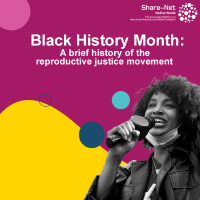Black History Month – A Brief History of the Reproductive Justice Movement
Posted by Nicole Moran on February 26, 2021 at 12:14 pm

Introduction
All throughout February, the achievements, excellence, culture, and history of Black Americans are being recognized and celebrated in the United States and acknowledged throughout the world. At Share-Net Netherlands (SNNL) we want to take this opportunity to highlight the history of the movement for reproductive justice, a term coined by African American women which embeds reproductive rights within a social justice framework.
This Black History Month, we’re sharing a brief history of the reproductive justice movement, rounding it off with some resources that further highlight the history and experiences of black women and LGBTQ+ people in the fight for reproductive justice
Historical context of reproductive injustice
The necessity of a reproductive justice framework is underscored by the historical roots of the reproductive oppression black, indigenous and women of colour (BIWOC) and LGBTQ+ people have faced.
During the slavery era in the United States, the sexual and reproductive capacities of enslaved African women were viewed as the property of their owners. Dehumanised as they were, enslaved women also became the non-consenting study subjects central to the birth of gynaecology. These women were operated on without anaesthesia as they were believed to be able to withstand extreme pain, a false belief about the biological difference in pain tolerance between black and white people that still holds credence in medicine today[1]. Even with the abolition of slavery and the 20th century civil rights movements, black women’s bodies found itself situated at the centre of larger social issues such as overpopulation and criminality. With the eugenics movement of the late 19th and early 20th century propagating ideas of decreasing birth rates among those deemed “unfit” or “genetically inferior”, the pro-creative exploitation of black women continued through discriminatory and restrictive policies, such as federally funded welfare programmes which underwrote the coercive sterilization of thousands of poor African American women[2]. With women of the early feminist health movement of the late 20th century demanding greater bodily autonomy, at the centre were the wants and demands of white, middle-class women, which greatly focused on legalizing abortion as an individual choice, and largely ignored the needs and issues of women of colour, poor women, and LGBTQ+ people such as an inability to access to these services, unsafe homes and communities, inadequate wages, or discriminatory policies. In response to the monochromatism of this early feminist health movement, the reproductive justice movement was born.
To read the full overview, please see here
